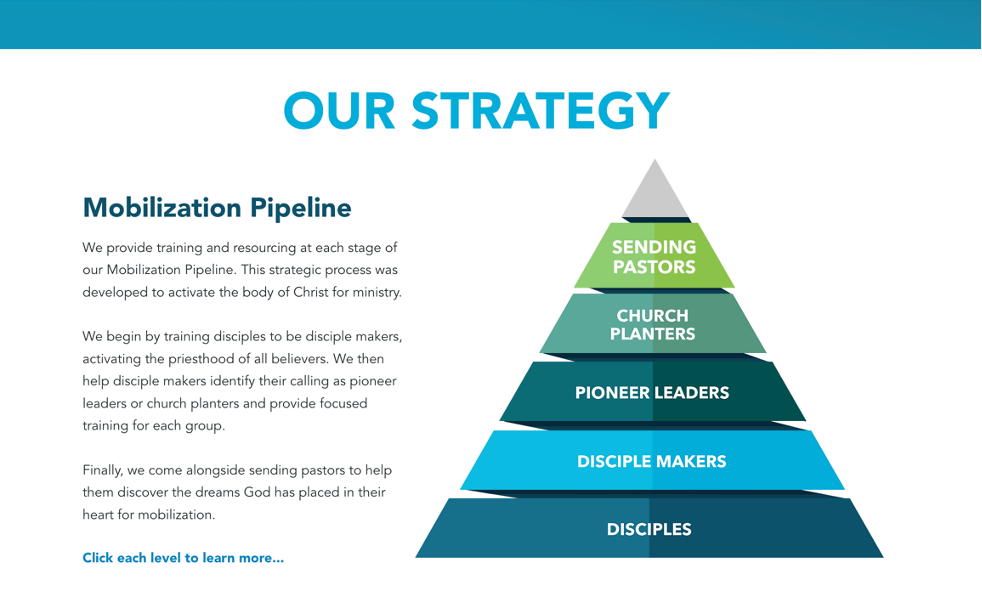Our mission at Mobilize the Church is to activate thousands of disciple-makers, pioneer leaders, and church planters. We have been dreaming about this Jesus movement since we launched the organization, and we pray for nothing less. Could we see a kingdom movement in our lifetime? Our growing post-Christian culture and many other indicators seem to be pointing in the opposite direction.
The same challenges existed before the First Great Awakening and The Second Great Awakening, and yet God faithfully answered the prayers of fervent catalysts and tireless leaders along the way.
We believe if we want to experience a Jesus movement in our lifetime, it will be through the prayers and leadership of a local church in collaboration with other churches.
It will take place within a church-planting network. So, what is a church-planting network? Very simply, it is four to six pastors who work together to plant more gospel-centered churches.
The Cooperative
Maybe the best comparison of a church-planting network is a local farmer’s co-op. I grew up in South Dakota with a front-row seat to my grandpa’s farm. There were times when an emergency happened to him or to other farmers, and all the farmers of the region would show up to help solve the problem, harvest the fields, or raise a barn together. They worked side by side for the good of the region.
A farmers' cooperative functions much like a well-organized network, where individual members—typically local farmers—join forces to achieve shared goals.
Co-ops enable farmers to pool their resources, knowledge, and buying power. This collaborative structure helps small-scale farmers access better supply prices, negotiate higher market rates for their products, and gain valuable support in marketing, distribution, and sustainable farming practices.
By leveraging the strength of many, the cooperative model allows members to thrive in a competitive marketplace that might otherwise be challenging to navigate alone. While some farmers may prefer the autonomy of going solo, they risk being more vulnerable to financial pressures, market challenges, and limited access to resources.
Church-Planting Networks
The same cooperative model can be seen in networks of pastors in like-minded churches. Each network is typically led by an apostolic leader who prioritizes building the kingdom over building a castle. The leader normally pastors a church that is also relentlessly dedicated to catalyzing movements of reproducing churches in their region.
To quote Sam Stephens of India Gospel, “What small groups are to churches, networks are to movements.”
Changing the world is bigger than any one of us can do alone—but it’s not more than all of us can do together. The Great Commission won’t be accomplished by one leader, one church, one denomination, or one network. We will all need to work together. Where we see kingdom movements and church multiplication happening across the globe, it is often through reproducing networks that create the movement's infrastructure.
Five Benefits of Networks
Pastors and leaders often experience five major benefits when they collaborate together in a network.
1. Networks Dream God-Sized Dreams
Church-planting networks attract leaders who have a common vision for accomplishing the mission of Jesus. This synergy almost always creates tremendous enthusiasm and a bigger dream than any of its individual parts. Matthew 18:20 says, “Where two or three gather in my name, there am I with them.” In a network, leaders experience God's presence in a tangible way as he gives them a vision of what they could accomplish together. Leaders dream God-sized dreams together!
2. Networks Produce Friends on Mission
Bringing people together in community doesn’t often result in them living the mission. However, whenever people are aligned and living out their mission, community will often be the result.
As the ancient proverb says, “If you want to go fast, go alone, but if you want to go far, go together.”
Like the farmer’s co-op, when life is challenging or when you feel like giving up, your friends will be there to sustain you, to cry with you, and maybe even provide a few belly laughs and snorts. It can be lonely pastoring a church-planting church and moving forward with a network, is so much better than languishing in your office alone.
3. Networks Mitigate Church-Planting Risks
Anyone who has started a church knows that church planting is risky business. Many leaders want to plant new churches, but they tend to be overly cautious because starting a new church often requires a significant investment of people and resources. But when you’re part of a network, you immediately mitigate the risk involved by leaning on the collective wisdom of the group. As a result, you’ll be better qualified to know which new churches have the best chance of success and how to better allocate your resources.
4. Networks Focus on Clear Outcomes
The accountability of a network provides results. This same accountability is why we seek out counselors, hire executive coaches, and discover personal trainers. They help us get results that we wouldn’t otherwise get on our own. Church-planting networks work the same way. When we’re answering to other people, we do things we wouldn’t normally do on our own. The difference between churches that actually plant new churches and those that only talk about it is accountability.
5. Networks Are All About God’s Kingdom
Networks build the kingdom, not individual castles, and they do this by tearing down the walls that divide us. Think about how you are reaching your community, region, or state for Christ—and how much bigger your impact could be if you worked with other churches.
I have seen what God can do through leaders who sincerely believe we are better together. Collaboration is the key.
This doesn’t mean networks won’t get off track and start turning their network into a castle. However, with the right people, hearts, values, and kingdom scorecards, movement will be on the other side of collaboration and mutual sacrifice. We need more leaders and more networks planting churches together!
Final Thoughts
When we first formed Mobilize the Church, we drew on the whiteboard a simple pyramid we now call our mobilization pipeline (see graphic below). The bottom level is the foundation for the entire pyramid. It’s disciples making disciples. But at the very top is a group of people we call “sending pastors”.
Sending pastors are men and women who have a heart to plant churches and want to mobilize more people for ministry. If that’s you, our prayer is to partner with you and help you start and sustain a church-planting network.
You may be able to plant a few churches out of your church, but your legacy will be the number of churches you brought around you to plant together. Maybe you can learn from my grandpa! Don’t go it alone. Join other workers and experience the community and fruit of multiplication on the other side.
We are currently leading a team of pastors and leaders through a simple process for starting and sustaining reproducing networks. To join our next cohort of leaders, send me an email, and I’ll share more information.
Dwight Nash is the Co-Founder and Executive Director of Mobilize the Church. You can reach him at dnash@mobilizethechurch.com or by calling 214-458-3981.









Thanks Dwight for outlining these excellent insights and benefits for churches to participate together in networks for multiplication. The Central Canada District is grateful for you and the team at "Mobilize The Church"!